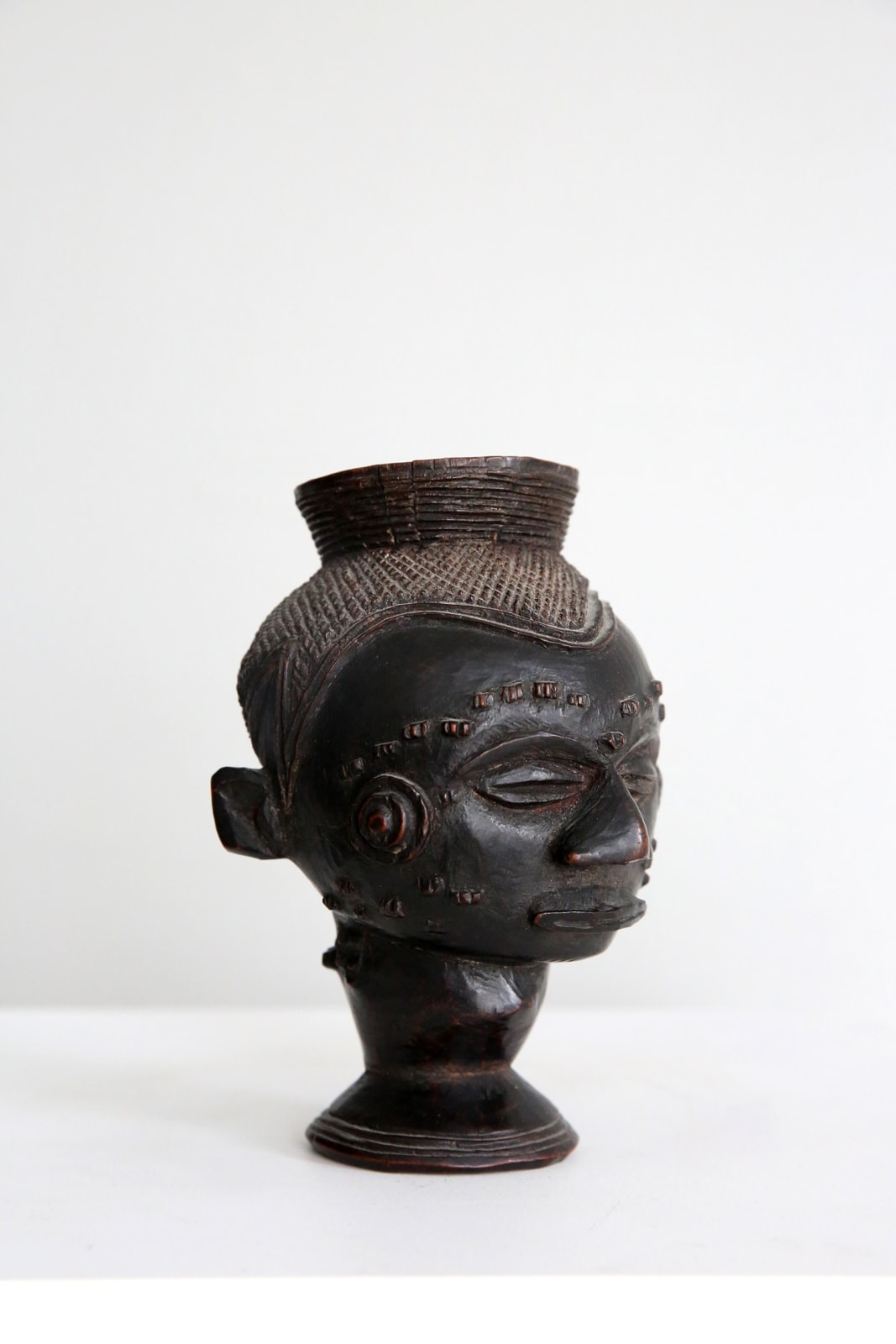The Wongo Master of the Pursed Horizontal Lips
Wood
height 5 7/8 in
Further images
A cup carved in the form of a hollowed human head on top of a narrowed neck complete with an Adam’s apple beath a face shaped with pursed lips, rising nose and slit eyes originates from Congo’s Wongo peoples, part of the Kuba cultural realm. Ornate cups of this type were carved for titled individuals such as princes, chiefs, and other dignitaries. Palm wine, obtained from the raffia palm tree was the most popular beverage consumed in the Kuba region. While any adult male has his personal cup, only the upper echelons of society could commission anthropomorphic examples from crafted sculptors. Such elaborate carved cups established the title and refinement of the owner, serving as display pieces as well as functional objects. Just as the Medici and the Dukes of Burgundy, Kuba royalty were eager to surround themselves with a host of artists.
The Kuba empire comprised more than seventeen distinct ethnic groups united under the leadership of the Nyimi, or king. These various Kuba subgroups were distinguished on the basis of their origins and languages, yet they all shared the appreciation of works produced by their skilled artists. Many of the finest known carvings were created by Wongo sculptors and traded to the Kuba proper, who lived to the east of them. The present cup can be positively attributed to a Wongo artist on the basis of stylistic criteria. Especially the abundance of keloid scarifications on the forehead and cheeks, as well as the large protruding circular motifs on the temple are hallmark characteristics of Wongo anthropomorphic sculpture.
While the identity of the creators of these exquisite drinking vessels hasn’t been recorded, stylistic similarities make it possible to discover anonymous masters. Active at the turn of the twentieth century, we have chosen to nickname the artist of the present cup, “The Wongo Master of the Pursed Horizontal Lips”, inspired by one of the identifying signature iconographic elements of his anthropomorphic cups that set him apart from other Wongo sculptors. Several cups of this master carver were collected between 1907 and 1909 by Hungarian anthropologist Emil Torday and currently held by the British Museum.
This sculptor is especially known from a group of exquisite drinking vessels shaped as figures, standing on short legs set apart, arms akimbo, the head and body providing a waisted cup. Jan Vansina, a Belgian anthropologist who documented the history of the Kuba, wrote about one of these: “this cup represents a woman of rank wearing jewelry on her arms and abundantly scarified. Any Kuba sees immediately that the patterns shown on the torso and abdomen are ambiguous. They are part of those that appear on women’s bodies among central Kuba, but untypical of that style. The patterns also belong to the style used for decorating wooden objects. The ambiguity points to a visual pun, reminiscent of Magritte: “This object is not a women, it is a cup.” The Kuba delighted in visual puns and double entendre.”
“The Wongo Master of the Pursed Horizontal Lips” in all likelihood was associated with the Wongo court seen the number of identified examples. The sovereign probably distributed cups to his vassals and the few visiting European explorers. His signature style also made school as several cups bear close resemblance yet differ on important details, especially the mouth. While the facial scarifications might be individualized on every cup, it is especially the shape of the lips - pursed, narrow and elongated horizontally - that identify the hand of our master carver. Circular incisions decorating the base and upper ridge of the vessel are a second stylistic signature, as is the specific shape of the triangular nose. Besides the British Museum, also the Royal Museum for Central Africa in Tervuren holds cups by this talented sculptor, as does the Fowler Museum, the Buffalo Museum of Science, and the Penn Museum. A cup in the Berlin museum might be carved by an artist working in the immediate environment of our sculptor. A double cup is held by the Brooklyn Museum and several head-shaped examples are in various private collections. It should be noted that most of these cups left Congo before 1920, establishing the active career of the anonymous artist around 1890-1910.
Provenance
Hélène Leloup, Paris, France, 1991
Prof. Boris Magasanik, Cambridge, USA
By descent through family, -2014
Private Collection, Antwerp, Belgium, 2014-2023
let's keep in touch
Join our community & never miss out on a DUENDE moment from now on
* denotes required fields
We will process the personal data you have supplied to communicate with you in accordance with our Privacy Policy. You can unsubscribe or change your preferences at any time by clicking the link in our emails.









